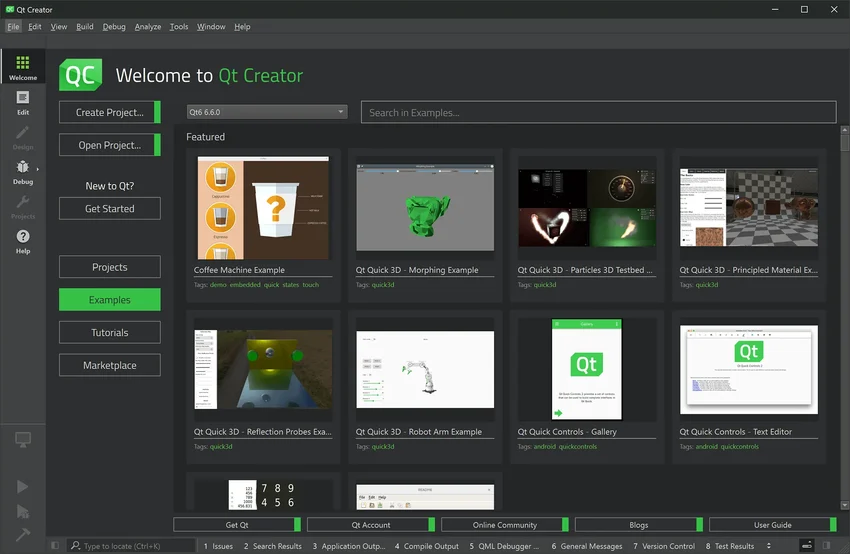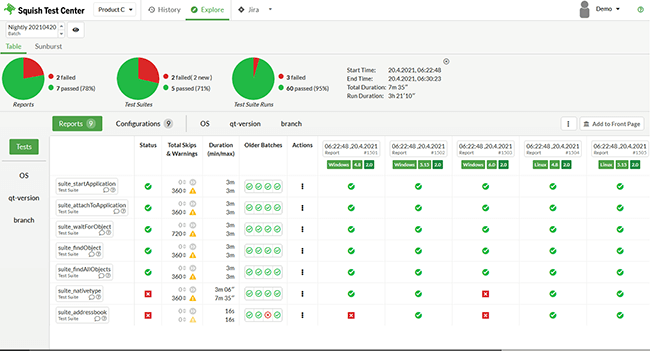We Partner with Qt Group to Streamline Cross-Platform Software Development

We are happy to announce our partnership with Qt Group, a global company behind the famous cross-platform C++ framework that provides technology and tools for software development for desktop, mobile and web platforms. Our partner status certifies the high level of Promwad's expertise in custom application development based on Qt technologies.
Qt is a comprehensive application development framework with extensive tools, libraries and APIs for various platforms: PC, mobile devices, set-top boxes, smart TVs, and embedded systems. More than 1.5 million engineers use Qt solutions in over 70 industries worldwide. The main programming language is C++, but other languages are also available: Python, Java, and C#.

IDE for application development. Source: qt.io
How Promwad works with Qt products
We use Qt for custom software development, where our clients require platform compatibility for multiple devices.
Here's one of our case studies: commissioned by a European digital service provider, we have used Qt tools to develop the front-end for an OTT application available on Linux, iOS, Android and smart TV (as an app for Android TV). Another application of Qt technologies is the development of interfaces and smart devices. Here are just a few recent examples:
- We developed a Wi-Fi enabled live video streaming camera and a graphical user interface for this device.
- Also, we designed a smart torch with a built-in camera, video streaming support, and an Android app working as a remote monitor that also maintains a video/image gallery, in addition to controlling and configuring the device.
Here at Promwad, we use the Qt framework not only for GUI implementation — either Qt-Widgets-based UI or QML-based apps, but also for the whole app's business logic with non-GUI modules. Our engineers use such tools as Qt Network, Qt Sql, Qt XML, State Machine Framework, Qt DBUS, Qt gRPC.
Our engineering expertise also covers the usage of Qt for MCUs: we employ this framework to develop high-performance applications for devices based on embedded microcontrollers and microprocessors (MPU). With the Qt toolkit, we can ensure smartphone-like UX on wearable and portable devices with resource-limited hardware. Our engineers successfully address the hardware and software constraints of embedded systems and MCU-based devices by leveraging hardware acceleration, memory optimisation and lightweight UI.

Qt for MCU-based devices. Source: qt.io
Since our projects are mostly CMake-based, we’re not limited to the IDE and Qt products, letting our developers use other tools of their choice, such as Visual Studio or XCode. Some prefer Vim and Emacs, but Qt Creator IDE is also quite popular among our software engineers. Also, we are going to use Qt for Automotive and Qt for Device Creation.
Benefits of Qt software development services
Qt-based development significantly accelerates the time to market by organising the entire development cycle in a single environment. It empowers software engineers with the following advantages for developing interfaces, applications and embedded software:
- Cross-platform. The framework allows you to write code once and deploy it on multiple devices and platforms, including Windows, macOS, Linux, Android, and iOS. You can even involve it in your smart TV app development projects.
- Extensive libraries and APIs. Libraries contain components that are ready to use out-of-the-box for various development areas: GUI, networking, multimedia, database integration, multimedia, 2D/3D graphics processing, inter-process communication, XML, DBUS, CAN bus/Modbus, in addition to general logic-like file operations, convenient multi-threading, etc.
- GUI development tools. With Design Studio, designers can create user interfaces using the WYSIWYG (What You See Is What You Get) approach with animation and custom scripts. Unlike most other UX/UI design tools, Qt Design Studio produces ready-to-use QML code.
- Quality assurance (QA) tools. QtTest module is a fully-functional test framework that covers the code with unit tests, ensuring its quality and maintainability. And Squish, a 3rd-party tool, enables automated GUI testing!
- Flexible licensing. Qt offers two licences: a Lesser General Public License (LGPL) for open-source projects and a commercial licence supporting developing own software based on Qt. The LGPL licence is fine for most commercial projects unless static linking is required.
- Qt Community. Thanks to its comprehensiveness, excellent documentation, and flexible licensing system, Qt has built up a large audience of followers who enjoy building apps with Qt, both open-source and commercial.

Qt Quality Assurance tool interface. Source: qt.io
Summing Up
Qt is a comprehensive application development environment. Its main advantage is its cross-platform approach: code created with Qt tools can be deployed on various devices while simplifying QA and testing. This approach dramatically speeds up the time to market, also simplifying the QA and stabilisation phase.
In addition, a number of open-source libraries and applications are based on Qt. KDE and its apps is one of the largest and prominent examples, demonstrating that software engineers prefer Qt to any other framework for such an impactful project, that has 100s of millions of users.
Promwad's partnership with Qt will strengthen our expertise in C++/Python software development with Qt and help create advanced and robust solutions for our clients, saving their time and money.
Contact us if your project needs Qt-based software development.








